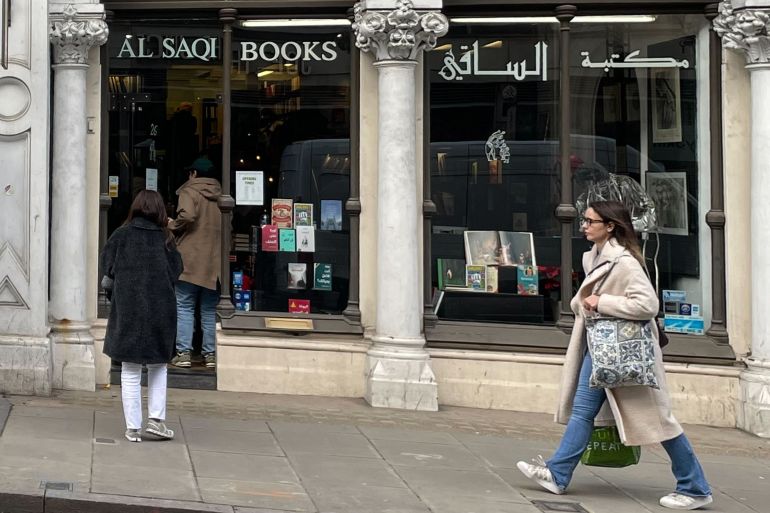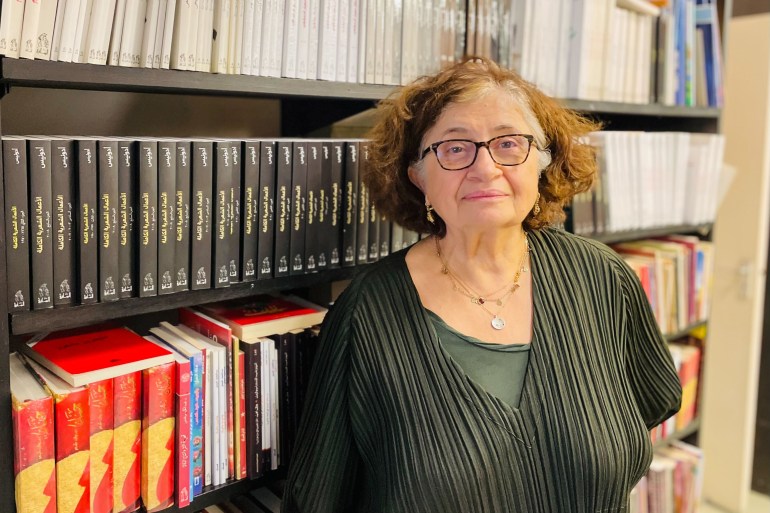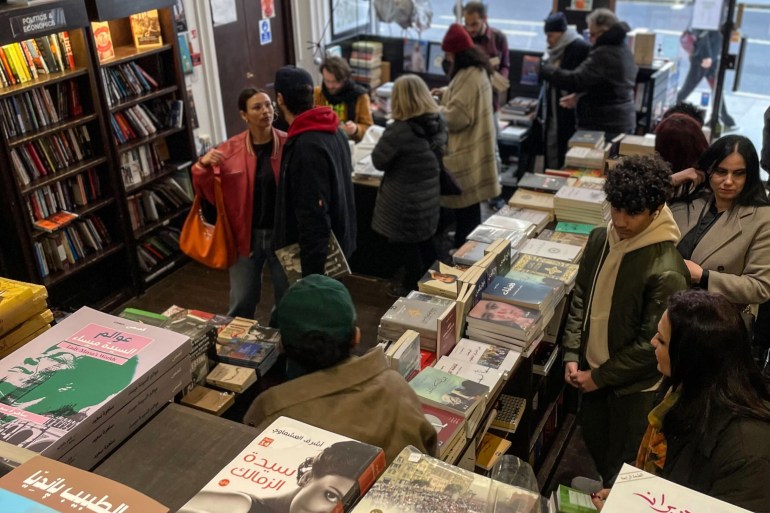After 44 years, London’s first Arabic bookshop closes down
Al-Saqi Books represented a treasure trove of literary works for Arab expatriates in London and visitors alike.

London, United Kingdom – The last days of Al-Saqi Books were some of its busiest.
A closing-down sale ensured a steady stream of customers flitting in and out, most expressing confusion and disappointment at the news that the iconic London bookshop, located in the Bayswater area, would close its doors for the final time on December 31.
Keep reading
list of 3 itemsBooks across borders: Rebuilding Gaza’s destroyed bookshop
Resurrection by reading: An ode to used books
“It’s such a sad trend,” muttered one older man in a Syrian dialect as he stood by the cashier. “People don’t want to read books any more; they prefer their tablets and laptops.”
Established in 1978 as the first Arabic bookstore in London, Al-Saqi Books represented a treasure trove of literary works for Arab expatriates living in the city and across Europe. It was an essential destination for Arabs visiting London, who were buoyed by the fact that they could get their hands on books that would otherwise be censored in their own countries.
“For Arab tourists, Saqi Books was a must-see place,” said Badr al-Modaires, a Kuwaiti writer in his late 60s who travels to London four times a year.
“It’s one of the symbols in London,” he added.
“Every visit here, I have to go and buy books for myself and my friends, who give me a list of what they want.”

‘A home away from home’
The lilting voice of Algerian-Lebanese singer Warda’s famous song Batwanes Beek filtering throughout the shop did little to alleviate Salwa Gaspard’s pain.
As one of the co-founders, shutting down the bookshop after 44 years was the last thing that she wanted.
“I’ve spent a lifetime caring for this bookshop – more years than raising my own children,” she said. “My husband, also a co-founder, feels like he is losing a child. But have you seen what London is like these days? It’s too much.”
Various economic challenges, some driven by the United Kingdom’s departure from the European Union and fallout from the coronavirus pandemic, along with high shipping costs, increasing prices of books and extortionate taxes, have weighed heavily on the shop.
“I read somewhere that two-thirds of UK residents are cutting down on non-essential stuff, and books and the cinema count as non-essential,” she said. “Recreational items are now available from the comfort of one’s home, whether that is buying a digitised book or renting a movie.”
Gaspard, along with her husband Andre and their late friend Mai Ghoussoub were living in Paris during the late 70s, having fled Lebanon due to the civil war. Together, they decided on opening the bookshop after Ghoussoub noticed a lack of a physical Arab cultural space in London.
The name Saqi and its logo are derived from a painting by an influential Iraqi artist, Jawad Salim, called The Water Seller.
“We liked it because we saw it as a metaphor for watering culture, or a culture-seller,” Gaspard said.

The bookshop started small, buying stock from publishers in Lebanon and Egypt.
“In the 80s, the Arabs were thirsting for knowledge and treated our bookshop as an oasis,” she said. “It was a home away from home.”
The shelves later grew to include books in English, to satisfy growing curiosity among Westerners to learn about Arabs culturally, something that was limited by the mainstream media’s portrayal of the Arab world.
But the past four decades were not without challenges and controversy.
Recently, in July 2021, the basement flooded, destroying hundreds of books.
The shopfront’s windows have also been smashed a few times, such as during the Salman Rushdie Satanic Verses affair in the late 80s.
Saving the legacy of the Saqi culture
Over the years, Al-Saqi Books attracted its fair share of celebrities.
Syrian poet Adonis and the late Egyptian feminist Nawal el-Saadawi were no strangers to the bookshop.
Ahmed Zaki Yamani, the former Saudi minister of petroleum, and Suheil Bushrui, the late Palestinian professor and prominent scholar of Lebanese writer Gibran Khalil Gibran’s works, were also frequent visitors.
“Years ago, Chris Martin of Coldplay came here to look for a copy of One Thousand and One Nights for his children,” Gaspard said. “[British musician and composer] Brian Eno also came here.”
For Mohammad Masoud, a bookseller at Al-Saqi Books, the closure feels unfathomable.
For the past two years, the 28-year-old has answered almost every question customers had about various authors or titles.
“For me, Saqi was like an edifice that would always remain,” he said. “I had heard about the bookshop for years, but never imagined I would get an opportunity to work in it. It was a dream come true.”

Masoud moved to London from Jordan in 2020, and had previously worked in the Abdul Hameed Shoman Library and Books@cafe in Amman.
Once he got over his shock at the news that Al-Saqi would shut, he set to work on Maqam, an initiative to save the Arabic content and books in London.
“The culture I experienced here is very rich and I don’t think it will be replicated anywhere else,” he said. “People would come to Saqi with a genuine interest in knowing more about the books and buying them. Here, I found that regardless of one’s background – Arab and Westerners – there was a wide turnout for the Saqi culture, the experience of being hungry for books, wanting to know more.”
He wants to help pass down this culture to the next generation and his vision begins with a crowdfunding campaign that will launch in January.
The focus is to continue the legacy of Al-Saqi Books, as a cultural, educational and media production space, rather than a bookshop.
“Arabs in London would come to Saqi to feel part of an extension of the cultural space, one that is not taken over by politics or religion,” he said. “The culture is a counter to what the mainstream media has portrayed Arabs as in the last 30 or 40 years: as a backwards, regressive conservative Islamist monolith, with no heritage and no diversity.”
Now is the time for younger Arab generations in London to seize the Arab cultural space, he explained, saying many people – Arabs and Westerners alike – want to know more about Arab culture.
“This is what Maqam is about. It exists for people who are in need of Arabic content and searching for belonging,” Masoud said, referring to the new initiative. “It will include a cafe, a space for reading, a place for doing production, calligraphy, embroidery, and for learning the Arabic language.”
Despite the end of an era for the bookshop, Al-Saqi’s two publishing houses in English and Arabic under the same name will continue to operate in London and Beirut respectively.